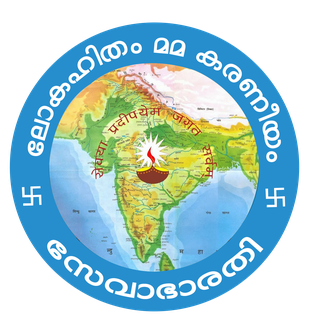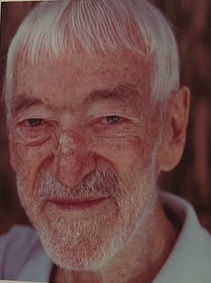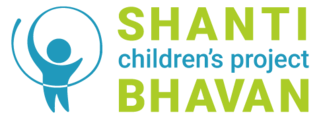Related Research Articles

The Mata Amritanandamayi Math (MAM) is an international charitable organization aimed at the spiritual and material upliftment of humankind. It was founded by Indian spiritual leader and humanitarian Mata Amritanandamayi in 1981, with its headquarters in Paryakadavu, Alappad Panchayat, Kollam district, Kerala. Along with its sister organization, the Mata Amritanandamayi Mission Trust, MAM conducts charitable work including disaster relief, healthcare for the poor, environmental programs, fighting hunger and scholarships for impoverished students, amongst others. It also runs the seven-campus university known as Amrita Vishwa Vidyapeetham, 90 chain of English medium CBSE schools known as Amrita Vidyalayam, and classes in yoga, meditation and Sanskrit.
Forward caste is a term used in India to denote castes which are not listed in SC, ST or OBC reservation lists. They are on average considered ahead of other castes economically and educationally. They account for about 30.8% of the population based on Schedule 10 of available data from the National Sample Survey Organisation 55th (1999–2000) and National Sample Survey Organisation 61st Rounds (2004–05) Round Survey.

Rashtriya Seva Bharati is a non-governmental organization (NGO) that works with economically weaker sections of Indian societies, including tribal.

Deepalaya is an Indian non-governmental organization that aids the development of the urban and rural poor in India, with a focus on children. Founded in 1979, it is headquartered in Delhi. Deepalaya primarily serves the urban slums of Delhi, but also works on rural development in the states of Haryana and Uttarakhand. Deepalaya's focus is on sparking sustainable development from within a community.
Agastya International Foundation (Agastya) is an Indian education trust and non-profit organization based in Bangalore, India whose mission is "to spark curiosity, nurture creativity and instil confidence" among economically disadvantaged children and teachers in India. A team of scientists, educators, and entrepreneurs led by Ramji Raghavan founded Agastya in 1999. Agastya's founders include the late K.V. Raghavan, former chairman of Engineers India Limited and Dr. P.K. Iyengar, former chairman of the Indian Atomic Energy Commission. Agastya runs hands-on science and art education programs in rural, semi-urban, and urban regions across 19 Indian states. It is one of the world's largest mobile and hands-on science education programs catering to economically disadvantaged children and public-school teachers.
Sankurathri Foundation (SF) was established in 1989 by Dr. Chandra Sekhar Sankurathri in memory of his wife Manjari, son Kiran and daughter Sarada, who died in the bombing of Air India Flight 182 off the coast of Ireland on 23 June 1985.

Vicente Ferrer Moncho was a Jesuit missionary who spent his life working to improve the lives of the poor in the mission he founded in Southern India. Today the Vicente Ferrer Foundation carries out humanitarian projects in Andhra Pradesh, bringing aid to over 2.5 million poor people.

The Shanti Bhavan Children's Project is a U.S. 501(c)(3) and India 80-G non-profit organisation based in Bangalore Karnataka, India, that operates a pre-K-12 residential school in Baliganapalli, Tamil Nadu. The school annually enrolls 12 boys and 12 girls for its incoming pre-school class. Thereafter, students stay at the school year-round except for summer and winter breaks. Students attend Shanti Bhavan free of charge and are provided with nutritional meals, clothes, shelter, education, healthcare and emotional and mental support. Shanti Bhavan is accredited by the Council for the Indian School Certificate Examinations (CISCE), and administers the ICSE and ISC exams during students' 10th and 12th grades. After students' 12th grade, Shanti Bhavan also pays for their college education.
The Madhya Pradesh Rural Livelihoods Project (MPRLP) works with local village assemblies, Gram Sabha, to facilitate and guide community-driven collective and individual action to reduce poverty in the state of Madhya Pradesh, India.

Nandamuri Taraka Rama Rao served as Chief Minister of United Andhra Pradesh for three terms, between 1983 and 1995. He was the first person to hold the office while not a member of the Indian National Congress, while representing the Telugu Desam Party (TDP), which he himself founded in 1982. Rama Rao's time in office saw his ousting in an August 1984 coup after 1½ years in office, while he was abroad in the US undergoing coronary heart surgery. He was removed by Thakur Ram Lal, the Governor of Andhra Pradesh, and replaced with Nadendla Bhaskara Rao, the finance minister. Having come back from surgery, Rama Rao regained his position through demonstrating his majority support from members of the Indian Legislative Assembly. He returned to office in September 1984.

Society for Elimination of Rural Poverty (SERP) is an autonomous society of the Department of Rural Development, Government of Andhra Pradesh. SERP is implementing Indira Kranthi Patham (IKP), a statewide community driven rural poverty reduction project to enable the poor to improve their livelihoods and quality of life through their own organizations. It aims to cover all the rural poor households in the state with a special focus on the poorest of the poor households. SERP also played an active part in the relief efforts taken up by the Andhra Pradesh Government during the devastating Indian Ocean tsunami in 2004.
India Development and Relief Fund (IDRF) is a Maryland, US-based 501(c) (3) tax exempt, non-profit organization that supports impoverished people in India, Nepal and Sri Lanka. IDRF's programs span all over India from Jammu and Kashmir to Tamil Nadu, and from Gujarat to Arunachal Pradesh, Nepal and more recently Sri Lanka. Since its inception in 1988, IDRF has disbursed $34 million in grants to various developmental programs pertaining to areas like: education, health, women's empowerment, eco-friendly development, good governance, and disaster relief/rehabilitation.

Andhra Pragathi Grameena Bank is a Regional Rural Bank in India. It was established in 2006 as a Scheduled Commercial Bank as per Regional Rural Banks Act of 1976 to provide banking facilities in Ananthapuram, Sri Sathya Sai, Annamayya, Kadapa, Kurnool, Nandyal, Tirupati, Nellore, Bapatla and Prakasam districts of Andhra Pradesh. It is under the ownership of Ministry of Finance, Government of India
The Social Development and Research Foundation (SDRF) is an autonomous non-governmental organization (NGO) based at Greater Noida Greater Noida, in the National Capital Region (NCR)Delhi NCR of India. This organization was established and registered under Indian Trust Act 1882, with a mission to create conducive environment for education, relief to the poor, better health and hygiene facilities, and advancement of all kinds of charitable objectives of general public utility. The SDRF works pro-actively to bring out positive change in the lives of people who are genuinely deprived of opportunities in life.

India has a multi-payer universal health care model that is paid for by a combination of public and government regulated private health insurances along with the element of almost entirely tax-funded public hospitals. The public hospital system is essentially free for all Indian residents except for small, often symbolic co-payments in some services.
Andhra Pradesh Grameena Vikas Bank is an Indian Regional Rural Bank headquartered in Warangal, India. It was established in 2006 as a Regional Rural Bank as per Regional Rural Banks Act of 1976. By amalgamation, on 31 March 2006, of the following 5 banks, sponsored by SBI, to participate more energetically, with synergy, in the upliftment and development of Rural Farm Sector and Rural Non-Farm Sector, with emphasis on the deprived, the Rural Poor, Rural ISB and Rural Crafts. It is under the ownership of Ministry of Finance, Government of India.
Gutta Muniratnam was an Indian social worker, a member of the National Planning Commission of India and the founder of Rashtriya Seva Samithi (RASS), a non governmental organization engaged in the social welfare activities in over 2500 socio-economically backward villages in the Rayalaseema region, spread across the present day states of Andhra Pradesh and Telangana. He was honored by the Government of India, in 2012, with the fourth highest Indian civilian award of Padma Shri.
Shalini Moghe was an Indian educationist, social worker and the founder of Kasturba Kanya School for tribal children and Bal Niketan Sangh, the first Montessori school in the state of Madhya Pradesh. She was the chairperson of the Bharatiya Grameen Mahila Sangh, Indore, a national level non governmental organization working for the welfare and education of the disabled, orphans, under privileged and the economically weaker sections of the society and was involved with other Indore-based educational institutions such as Prestige Public School and Pragya Girls School. A winner of the Jamnalal Bajaj Award in 1992, she was honoured by the Government of India in 1968, with the award of Padma Shri, the fourth highest Indian civilian award for her contributions to the society.

Sri Gowthami Degree and PG College is a pioneering Under graduate and Post Graduate College at Darsi in Prakasam district, Andhra Pradesh, South India. It is the first college among the group of Sri Gowthami Educational Institutions (SGEIs) in Prakasam district, Andhra Pradesh State, established by the educationalist and social activist, Kanumarla Gunda Reddy in the year 2000. It is being managed and run by Sri Gowthami Urban and Rural Integrated Development and Educational Society.

Bunyan Edmund Vijayam (1933–2019) was an Indian geologist with major contribution to the field of Geology. A 1958–1959 Technical Report of the Council of Scientific and Industrial Research heralded the news that new developments had taken place in scientific matters led by a team of researchers at the Andhra University,
A new technique for the ion-exchange separation of uranium from thorium and rare earths has been developed. A simple chromatographic method for the estimation of thorium has been evolved. This utilizes thenoyl trifluoroacetone (TTA) in benzene as solvent-C. Mahadevan, U. Aswathanarayana, V. V. S. S. Tilak, B. E. Vijayam and D. Purushottam, Department of Geology, Andhra University.....
References
- ↑ "Seruds Official Site - November 2011". www.serudsindia.org/.
- ↑ "Something new has happened".
- ↑ "Sai Educational Rural & Urban Development Society (SERUDS)".
- ↑ "Samhita". Archived from the original on 2012-12-29. Retrieved 2012-12-08.
- ↑ "Sai Educational Rural & Urban Development Society".
- ↑ India, Seruds NGO. "Legal Status of the NGO in India - Donate NGO India".
- ↑ "ProPoor: South Asia Development News". propoor.org.
- ↑ "SERUDS Inc". SERUDS INC.
- ↑ "Seruds Inc - GuideStar Profile". Nonprofit data for donors, grantmakers, and businesses | GuideStar | Candid.
- ↑ "Seruds". Vimeo.
- ↑ "Seruds NGO - Joy of Giving Week: Sweksha | Willingly Yours!". Archived from the original on 2013-02-03. Retrieved 2012-12-08.
- ↑ "Old Age Home for Women". Seruds. Retrieved 2024-01-19.
- ↑ "NGO in Andhra Pradesh, India announces Sponsor a Child program". Archived from the original on 2012-10-17. Retrieved 2012-12-08.
- ↑ "Make a difference to someone's life this Diwali". Archived from the original on 2012-10-29. Retrieved 2012-12-08.
- ↑ "Business Briefs: Follow the Money, by Richard Springer, Staff Reporter". Archived from the original on 2012-12-20. Retrieved 2012-12-08.
- ↑ "SERUDS NGO announces new Child Development Programs". Archived from the original on 2012-12-14. Retrieved 2012-12-08.